| Book Name: | Energy Principles and Variational Methods in Applied Mechanics |
| Author: | J. N. Reddy |
| Category: | Engineering Books |
| Language: | English |
| Format: | |
| Free Download: | Available |
Download Energy Principles and Variational Methods in Applied Mechanics PDF Book
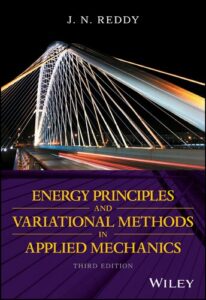
Book Description
A comprehensive guide to using energy principles and variational methods for solving problems in solid mechanics
This book provides a systematic, convenient introduction to using energy principles, traditional variational methods, and the finite element method to solve engineering problems involving bars, beams, torsion, plane elasticity, trusses, and plates.
It begins with a review of the fundamental equations of mechanics, the concepts of work and energy, and critical topics from variational calculus. It presents virtual work and energy principles, energy methods of solid and structural mechanics, Hamilton’s guide for dynamical systems, and classical variational approximation methods. And it takes a more unified approach than most solid mechanics books to introduce the finite element method.
Featuring more than 200 illustrations and tables, this Third Edition has been extensively reorganized. It contains much new material, including a new chapter devoted to the latest developments in functionally graded beams and plates.
- Offers clear and easy-to-follow descriptions of the concepts of work, energy, energy principles, and variational methods
- It covers energy principles of solid and structural mechanics, traditional variational methods, the least-squares variational method, and the finite element, along with applications for each.
- Provides an abundance of examples, in a problem-solving format, with descriptions of applications for equations derived in obtaining solutions to engineering structures
- Features end-of-the-chapter problems for course assignments, a Companion Website with a Solutions Manual, Instructor’s Manual, figures, and more
Energy Principles and Variational Methods in Applied Mechanics, Third Edition is both a superb text/reference for engineering students in aerospace, civil, mechanical, and applied mechanics and a valuable working resource for engineers in design and analysis in the aircraft, automobile, civil engineering, and shipbuilding industries.
About Energy Principles and Variational Methods in Applied Mechanics
Energy principles and variational methods are essential tools for analyzing and solving problems in applied mechanics, which is the study of the behavior of solid and fluid materials under the influence of external forces.
Energy principles involve energy conservation, which states that energy cannot be created or destroyed, only converted from one form to another. In applied mechanics, energy principles are often used to analyze objects’ motion or materials’ deformation under external loads. For example, the principle of least action, also known as the principle of stationary action, is a principle in classical mechanics that states that the path taken by a particle between two points is the path that minimizes the action, which is a measure of the energy required to move the particle.
On the other hand, Variational methods involve mathematical techniques to minimize or maximize a function, a mathematical expression that depends on a function and its derivatives. Variational methods are often used to find a system’s equilibrium configuration or determine the path of motion that a system will follow.
Both energy principles and variational methods are widely used in applied mechanics to solve various problems, such as determining the stress and strain in a beam subjected to a load, analyzing the pendulum’s motion, or predicting the behavior of a fluid flowing through a pipe.
Energy Principles and Variational Methods in Applied Mechanics
Publisher: Wiley, Year: 2017
ISBN: 9781119087373
Related More Books
See More POST On : Engineering Books

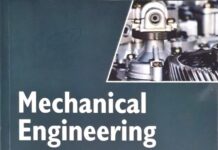

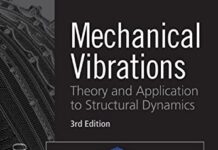


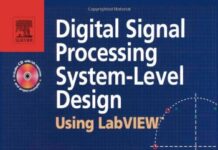

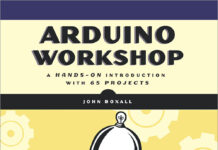
![[PDF] Draw Buildings and Cities in 15 Minutes Draw Buildings and Cities in 15 Minutes pdf](https://freepdfbook.com/wp-content/uploads/2021/06/Draw-Buildings-and-Cities-in-15-Minutes-218x150.jpg)


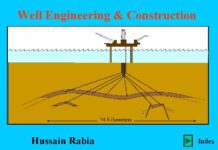
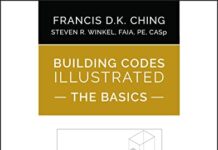




![[PDF] Digital Image Processing An Algorithmic Introduction Using Java Digital Image Processing An Algorithmic Introduction Using Java](https://freepdfbook.com/wp-content/uploads/2022/06/Digital-Image-Processing-An-Algorithmic-Introduction-Using-Java.jpg)




![[PDF] 43 Years JEE ADVANCED + JEE MAIN Chapterwise & Topicwise Solved Papers 43 Years JEE ADVANCED (1978-2020) + JEE MAIN Chapterwise & Topicwise Solved Papers Physics PDF](https://freepdfbook.com/wp-content/uploads/2022/03/43-Years-JEE-ADVANCED-1978-2020.jpg)

![[PDF] Problems in Physical Chemistry for JEE (Main & Advanced) Problems in Physical Chemistry for JEE (Main & Advanced) Free PDF Book Download](https://freepdfbook.com/wp-content/uploads/2022/03/Problems-in-Physical-Chemistry-for-JEE-Main-Advanced.jpg)
![[PDF] Engineering Physics (McGraw Hill)](https://freepdfbook.com/wp-content/uploads/2021/05/bafc8c2685bb6823a9c56134f7fba5df.jpeg)
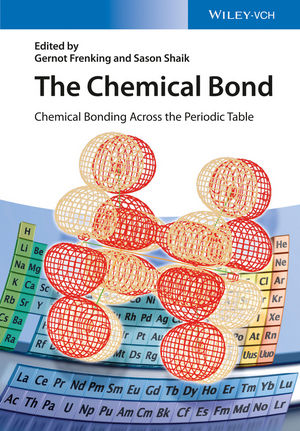
![[PDF] Engineering Chemistry By Shashi Chawla](https://freepdfbook.com/wp-content/uploads/2022/05/Theory-And-Practicals-of-Engineering-Chemistry-By-Shashi-Chawla-free-pdf-book.jpeg)
![[PDF] Chemistry: An Introduction to Organic, Inorganic & Physical Chemistry Chemistry: An Introduction to Organic, Inorganic & Physical Chemistry](https://freepdfbook.com/wp-content/uploads/2022/04/Chemistry-An-Introduction-to-Organic-Inorganic-Physical-Chemistry.jpg)
![[PDF] Essentials of Physical Chemistry Essentials of Physical Chemistry Free PDF Book by Bahl](https://freepdfbook.com/wp-content/uploads/2022/04/Essentials-of-Physical-Chemistry-bahl.jpg)
![[PDF] Biological control of plant-parasitic nematodes: soil ecosystem management in sustainable agriculture Biological control of plant-parasitic nematodes: soil ecosystem management in sustainable agriculture](https://freepdfbook.com/wp-content/uploads/2022/05/Biological-control-of-plant-parasitic-nematodes-soil-ecosystem-management-in-sustainable-agriculture.jpg)
![[PDF] Human Anatomy: Color Atlas and Textbook Human Anatomy: Color Atlas and Textbook Free PDF Book](https://freepdfbook.com/wp-content/uploads/2022/05/Human-Anatomy-Color-Atlas-and-Textbook.jpg)
![[PDF] Concepts of Biology Book [Free Download]](https://freepdfbook.com/wp-content/uploads/2022/05/Concepts-of-Biology.jpg)
![[PDF] Essentials of Biology [Free Download] Essentials of Biology Free PDF BOok Download](https://freepdfbook.com/wp-content/uploads/2022/05/Essentials-of-Biology-Free-PDF-Book-Downlaod.jpg)
![[PDF] Human Biology Book [Free Download]](https://freepdfbook.com/wp-content/uploads/2022/05/PDF-Human-Biology-Book-Free-Download.jpg)